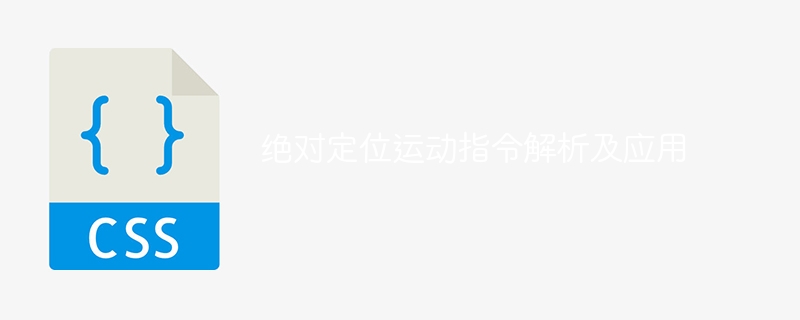

Absolute positioning motion command analysis and application requires specific code examples
1. Introduction
In modern industrial production, automated production equipment plays a vital role role. Among automation equipment, motion control is one of them. The absolute positioning motion instruction is a common instruction in motion control. This article will discuss its analysis and application and illustrate it through specific code examples.
2. Analysis of absolute positioning motion instructions
The absolute positioning motion instruction is an instruction that uses the target position as input to make the device perform an action of moving directly to the specified position. The following is a simple pseudocode for absolute positioning motion instruction analysis:
function absoluteMove(targetPosition) { currentPosition = getCurrentPosition(); // 获取当前位置 distanceToMove = targetPosition - currentPosition; // 计算需要移动的距离 move(distanceToMove); // 移动到指定位置 }
In this pseudocode, we first obtain the current position through the getCurrentPosition() function, and then calculate the difference between the target position and the current position. Finally, the move() function is used to realize the action of moving to the specified position. In actual applications, the specific implementation of these functions will depend on the motion control device and programming language used.
3. Application of absolute positioning motion instructions
Absolute positioning motion instructions are widely used in automated production equipment, such as machine tools, robots, etc. The following takes a simple machine tool control system as an example to illustrate the application of absolute positioning motion instructions.
Suppose we have a machine tool control system and need to implement a program so that the machine tool can perform cutting processing according to the specified coordinate position. We can use absolute positioning motion instructions to achieve this function. The following is a simplified sample code:
function main() { setWorkpieceOrigin(); // 设置工件坐标原点 absoluteMoveX(100); // X轴移动到100的位置 absoluteMoveY(50); // Y轴移动到50的位置 startCutting(); // 开始切割 } function setWorkpieceOrigin() { // 设置工件坐标原点的代码 } function absoluteMoveX(targetPosition) { currentPosition = getCurrentPositionX(); // 获取X轴当前位置 distanceToMoveX = targetPosition - currentPosition; // 计算需要X轴移动的距离 moveX(distanceToMoveX); // X轴移动到指定位置 } function absoluteMoveY(targetPosition) { currentPosition = getCurrentPositionY(); // 获取Y轴当前位置 distanceToMoveY = targetPosition - currentPosition; // 计算需要Y轴移动的距离 moveY(distanceToMoveY); // Y轴移动到指定位置 } function startCutting() { // 开始切割的代码 }
In this sample code, we first set the workpiece coordinate origin through the setWorkpieceOrigin() function, and then use the absoluteMoveX() function and absoluteMoveY() function respectively to implement the X-axis and Absolute positioning movement of the Y-axis, and finally starting cutting through the startCutting() function. This sample code is just a simplified example, and more details and security need to be considered in actual applications.
4. Summary
Absolute positioning motion instruction is a common motion control instruction and has been widely used in automated production equipment. This article introduces the analysis and application of absolute positioning motion instructions in detail through specific code examples. In practical applications, we need to write corresponding code to implement absolute positioning motion instructions based on specific equipment and requirements. I hope this article will be helpful to readers in understanding and applying absolute positioning motion instructions.
The above is the detailed content of Analyze and apply absolute positioning motion instructions. For more information, please follow other related articles on the PHP Chinese website!




